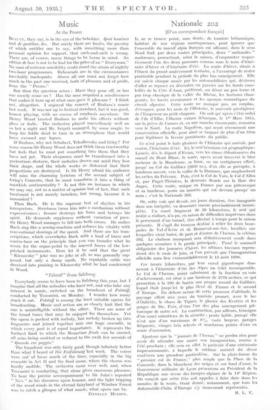Music
At the Proms BEAUTY, they say, is in the eye of the beholder. Quot homilies and de gustibus, &c. But surely there are limits, the passing Of which entitles one to say, with something more than Personal opinion for support, that such-and-such is wrong. There are, of course, many things to be borne in mind. An edition de luxe is not to be had for the price of an " Evelyn-Ian." No man of extreme sensibility could stand the strain of nightly two-hour programmes. Rehearsals are in the circumstances inevitably inadequate. Above all one must not forget how much in the past one received, both of pleasure and of profit, from the " Proms."
But then the question arises : Have they gone off, or has one merely come on ? Has the nose acquired a sensitiveness that makes it turn up at what once gave it pleasure ? I think not, altogether. I enjoyed the concert of Brahms's music last week. It was not up to festival standard, but it was good, honest playing, with no excess of emphasis anywhere. Sir Henry Wood trusted Brahms to make his effects without gloss or italic. The orchestra played marvellously well on SO hot a night and Mr. Szigeti managed, by some magic, to keep his fiddle dead in tune in an atmosphere that would have excused any lapses.
If Brahms, why not Schubert, Tchaikovsky and Grieg ? For some reason Sir Henry Wood does not think them trustworthy but feels that he must put something into them that they have not got. Their eloquence must be transformed into a Pretentious rhetoric, their melodies drawn out until they lose their shape, and the • whole works so distorted that their proportions are destroyed. Is Sir Henry afraid his audience will miss the charming lyricism of the second subject of Grieg's Concerto, that he must transform it into a thing of Mawkish sentimentality ? Is not this an instance in which we may say, not as a matter of opinion but of fact, that such treatment is not merely tasteless, but wrong, because it is unmusical ?
Then Bach. He is the supreme test of rhythm in his interpreters. Strictness turns him into a rnechanisin without expressiveness ; licence destroys his form and betrays his spirit. He demands suppleness without variation of pace. SIT Henry Wood manages to fall into both errors. He makes Each sing like a sewing-machine and reduces his vitality with conventional slowings of the speed. And there are his tran- scriptions,, avhich overwhelm Bach with a load of brass and contra-bass on the principle that you can transfer what he wrote for the organ-pedal to the massed forces of the low- pitched.• instruments. Here let it be said that the great " Klenovsky " joke was no joke at all, 'as was generally sup- posed, but only a damp squib. No reputable critic was deceived into praising in Klenovsky what he had condemned in Wood.
"Falstaff" from Salzburg Everybody seems to have been to Salzburg this year, but I imagine that all the nobodies who have not, and who take any interest • in music, switched on the broadcast of Falstaff, conducted by Toscanini, on Monday. I wonder how many stuck it out. Falstaff is among the least suitable operas for broadcasting. Music and action are so closely knit that the one is unintelligible without the other. There are none of the broad tunes that may be enjoyed • for themselves. Yet the opera is packed with melody, but melody broken up into fragments and joined together into one huge ensemble, in which every part is of equal importance. It represents the furthest limit to which the Mozartian finale can be carried, all arias being omitted or reduced to the swift few seconds of " Quando era paggio." • The broadcast was only fairly goOd;"thaugh infinitely better than what. I heard of The Entfithiunt last week. The voices were out of focus much of the time; especially in the big ensemble in Act II and the final scene, where the chorus was hardly audible. 'The orchestra came over well, and, when Toscanini is conduding, 'that alone gives enormous pleasure. To hear the precise ' accompaniment to Sir John's repeated " No's " in his discourse upon honour, and the light tripping of the wood-winds in the eternal fairyland of Windsor Forest was to catch a glimpse of what music, what opera can be.
DYNEWEY IIUSSEY.


































 Previous page
Previous page